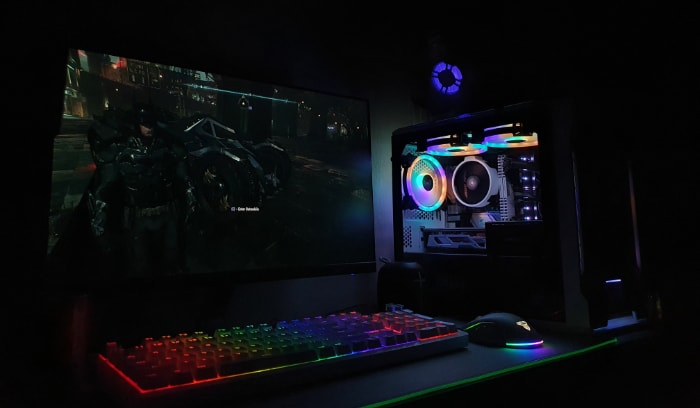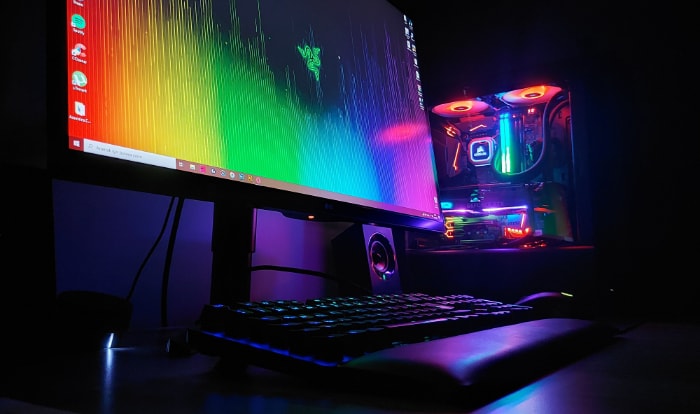PC Randomly Restarts While Gaming: Causes and Fixes

Imagine being deep in an intense gaming session, your team is on the brink of a critical victory, and then suddenly, without warning, your PC decides it's time for a surprise reboot. It's not just a nuisance; it disrupts your gaming experience and can even cause loss of progress in your games. Furthermore, frequent restarts could be indicative of a more significant problem, potentially threatening the health of your PC.
In this guide, we will explore the reasons why a PC might behave this way during gaming sessions, examining the common causes and exploring the different ways you can diagnose and resolve the issue.
With a sound understanding of the problem and clear step-by-step solutions, you'll be better equipped to prevent these unexpected interruptions, thus ensuring a smoother, more enjoyable gaming experience.
Understanding the Problem
Random restarts while gaming can be perplexing, as they seemingly occur out of nowhere, providing little to no error messages or warnings. This abrupt interruption can leave gamers puzzled about the root cause.
However, these restarts aren't as random as they may seem, as they're typically prompted by certain conditions in your PC that we'll cover in the subsequent sections.
Random restarts can happen at any point during gaming – sometimes after a few hours, or in other cases, a few minutes into a game. The restarts can also vary in their frequency – they may happen sporadically, or quite regularly.
The variability of these incidents makes this issue particularly challenging to diagnose. However, understanding the possible causes is the first step in troubleshooting.
Indications of the Problem
Your PC randomly restarting while gaming is the primary indication of this issue. However, other subtle signs could hint at an underlying problem. For instance, your PC might run unusually hot, or you might hear the fans spinning faster and louder than normal.
You might also experience other performance issues, such as your PC becoming significantly slower, games freezing or crashing, or the occurrence of the dreaded Blue Screen of Death (BSOD). You may also notice error messages related to driver failures or system errors.
Common Causes of PC Restart During Gaming
Understanding why your PC restarts randomly during gaming requires a knowledge of the common causes that can lead to this issue. Let's explore each of them in detail:
Overheating Issues
Overheating is one of the primary culprits when it comes to PCs restarting during gaming. The high demand of resources by modern games can make your PC components, especially the CPU and GPU, work at their maximum capacity, generating significant amounts of heat.
If this heat is not adequately dissipated, it can cause your PC to restart as a safety mechanism to prevent hardware damage.
Inadequate Power Supply
Power supply issues are another common cause of random restarts. If your power supply unit (PSU) is unable to provide sufficient power to your PC components during high-demand gaming sessions, it can result in system instability and subsequent restarts.
This is more common in systems where the PSU is of low quality or has a lower wattage than what's required by the system's components.
Outdated Drivers or Hardware
Outdated or corrupted drivers can also lead to random restarts. Drivers are essential for your PC components to communicate with your operating system. If they're outdated or corrupted, they might not work as intended, causing system instability.
Similarly, outdated or failing hardware components can also lead to system instability and restarts.
Software Conflicts or Corrupt Game Files
Software conflicts, including those between your game and other software running on your system, can also cause your PC to restart. Similarly, corrupted game files may also lead to system instability, causing your PC to restart unexpectedly during gaming.
Hardware Failures or Incompatibility
Certain hardware failures or incompatibilities can also trigger random restarts. For instance, a failing graphics card, RAM issues, or a faulty motherboard can all result in your PC restarting. Likewise, incompatibilities between your PC's hardware and the game requirements may also cause instability and restarts.
Viruses or Malware
Viruses or malware can cause a myriad of problems, one of which is causing your PC to restart randomly. Certain types of malware can affect system stability, leading to random restarts, especially during resource-intensive tasks such as gaming.
How to Diagnose the Issue

Now that we have explored the common causes of random restarts during gaming, it's time to discuss how you can diagnose this problem effectively.
Checking for Overheating
When it comes to diagnosing an overheating problem, you'll need to monitor your PC's temperature while gaming. Software tools like HWMonitor or Speccy can be used to track temperatures of your CPU and GPU. If you notice that temperatures rise significantly during gaming, that's a clear indication of an overheating issue.
Examining the Power Supply
Diagnosing a problematic power supply can be a bit tricky, as there's no software that can accurately measure its efficiency or capability.
However, an initial approach could be to check the power rating of your PSU and compare it with the power requirements of your PC components. If the PSU's rating is lower, it might not be providing sufficient power. Another sign could be the PSU making unusual noises or the PC restarting during peak power demand, like gaming or running a demanding application.
Checking for Software Issues
Software issues, including outdated or corrupted drivers and software conflicts, can be diagnosed through the Device Manager and Event Viewer in Windows.
The Device Manager can help you check for outdated drivers, while the Event Viewer can help you check for software errors leading up to the restart. Corrupted game files, on the other hand, can typically be diagnosed through the game client's repair or verify tool.
Investigating Hardware Failures
Hardware failures or incompatibilities can be harder to diagnose and might require a more hands-on approach. Tools like MemTest86 can help diagnose RAM issues, while a benchmarking tool like 3DMark can stress test your GPU and check for problems.
Similarly, checking whether your PC meets the minimum or recommended system requirements of the game can help diagnose hardware incompatibilities.
Performing Virus and Malware Scans
Lastly, viruses or malware causing random restarts can be diagnosed using a reliable antivirus or anti-malware program. Regular scans can help detect and remove any harmful software that might be causing system instability.
Troubleshooting and Resolving the Issue
After diagnosing the possible cause of your PC randomly restarting during gaming, the next step is to resolve the issue. Here's a comprehensive guide on how to approach each possible cause:
Cooling Your PC
Dust accumulation can impede airflow and contribute to overheating. Therefore, the first step in cooling your PC is to physically clean out dust from your system, especially from the fans and heatsinks.
Upgrading Cooling Systems
If cleaning doesn't suffice or if your PC still runs hot, consider upgrading your cooling solutions. This might involve adding more fans, installing a better CPU cooler, or even opting for liquid cooling solutions if necessary.
Resolving Power Supply Issues
If you suspect that your PSU is not providing sufficient power, consider replacing it with a higher-rated one. Ensure that the new PSU has enough wattage to support all your PC components, including the allowance for potential future upgrades.
Updating or Reinstalling Drivers
Outdated or corrupted drivers can be updated via the manufacturer's official website or through the Device Manager on Windows. If updating doesn't work, consider uninstalling and then reinstalling the drivers.
Checking and Resolving Software Conflicts
If you suspect corrupted game files are causing the issue, try reinstalling the game. Most game clients have a built-in option for verifying game file integrity which you can use before opting for a complete reinstall.
Checking for Windows Updates
Ensure your operating system is up to date, as this can help resolve many software conflicts. Regularly check for updates and install them as they become available.
Addressing Potential Hardware Failures
Use tools like MemTest86 to check for faults in your RAM. If any are found, consider replacing your RAM sticks. For graphics card issues, consider updating your graphics drivers first. If the problem persists, your graphics card might be failing and could need replacement.
Ensuring Adequate Protection Against Viruses or Malware
Ensure your antivirus software is up to date and schedule regular scans to keep your system clean. If you don't have any protection software, consider getting a reputable one.
Conclusion
Resolving the issue of a PC randomly restarting while gaming can be a complex process, requiring a good understanding of the potential causes and how to address them. From overheating to power supply issues, outdated drivers, and more, the root of the problem can vary greatly. Hence, it's crucial to approach this issue with a comprehensive understanding and a patient, methodical troubleshooting process.
In this guide, we've walked through the common causes, diagnosis methods, and possible solutions for this vexing problem. Armed with this information, you should be able to troubleshoot effectively and hopefully return to a stable, interruption-free gaming experience.
Remember, regular maintenance and updates are essential for keeping your PC running smoothly. This includes physical cleaning, updating drivers, running antivirus scans, and occasionally checking for any hardware issues.
At the end of the day, your gaming PC is an investment — not just in terms of financial cost, but also the time and effort you put into perfecting your gaming experience. By addressing these issues promptly and effectively, you can protect your investment and ensure many more hours of enjoyable, hassle-free gaming.


